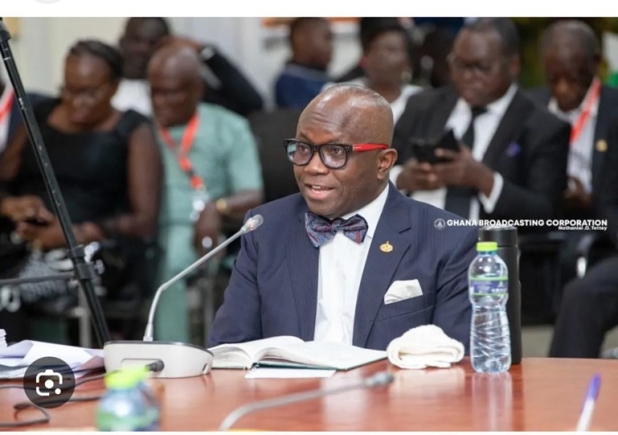Supreme Court nominee, Justice Kweku Tawiah Ackaah-Boafo, has suggested a limitation to the jurisdiction of the Supreme Court to reduce its caseload and improve the efficiency of justice delivery.
He explained that the workload of the apex court was heavy, partly because of the broad scope of its jurisdiction, which compelled it to sit almost weekly, an unusual practice compared to similar courts in other jurisdictions.
“Before you talk about numbers, look at the jurisdiction of the court. It has over eight jurisdictions.
Last time I checked, Ghana may be the only country with a Supreme Court which sits every week,” he said in response to a question on whether the Supreme Court was being packed when he appeared before Parliament’s Appointments Committee last Friday.
Justice Ackaah-Boafo cited Canada as an example where the Supreme Court heard fewer cases annually and sat only in specific sessions — winter, spring and autumn.
“They deliver between 65 and 80 cases a year. They receive over 500 cases, filter and at the end of the day, they may accept about 120 and do about 65,” he said.
The Appeal Court judge, therefore, recommended that the country consider a similar approach by transferring some jurisdictions to the Court of Appeal.
Empanelling
Asked if something should be done about concerns that the power of the Chief Justice to empanel judges allowed for favouritism in Supreme Court cases, the Supreme Court nominee acknowledged public concerns about the issue and suggested the adoption of an electronic system to empanel and the creation of multiple panel heads at the Supreme Court to prevent perceptions of favouritism.
In response to another question from the committee on incompetent judges who risked delivering low-quality decisions at the expense of the citizenry, he argued that appointed judges were presumed competent but admitted some may err, highlighting the need for retraining through the Judicial Training Institute (JTI).
When questioned further about some recommendations for monitoring, he supported the establishment of a statutory independent judicial commission to monitor, assess and offer promotions based on competence.
Regarding judicial misconduct, Justice Ackaah-Boafo affirmed that it was an ethical duty to report it through appropriate internal or official channels.
Commenting on the constitutional review process, the Supreme Court nominee suggested constitutional and judicial reforms, recommending changes to the petition process against Superior Court judges and proposing that three senior Supreme Court justices, not the Chief Justice, should determine prima facie cases in such circumstances.
The Court of Appeal Justice also called for a Police Independent Commission to handle complaints against officers of the Ghana Police Service.
On judicial delays, Justice Ackaah-Boafo, who was appointed to the judiciary in 2015 as a High Court Judge and elevated in 2022 as a Court of Appeal Judge, advocated capacity-building for judges, timely financial support, review of outdated civil rules, an expanded jury pool and time-bound criminal trials.
On what constituted misconduct on stated misbehaviour based on Article 146(1), the constitutional provision on the removal of a justice of the Superior Court or a chairman of a regional tribunal, Justice Ackaah-Boafo emphasised that breaches of the judicial code of conduct could amount to misconduct, but removal depended on context and severity.
He also acceded to a legal definition of “stated misbehaviour” by a Constitutional Instrument (CI) when he was asked if it should have been defined.
In response to a question on whether the judicial and administrative roles of the Chief Justice should be decoupled, he opposed the idea, emphasising that the holder of the office needed to find a perfect balance for both functions.
Ethics
Justice Ackaah-Boafo stressed the need for ethical restraint in public commentary by prosecutors, especially the Attorney-General, in response to a question on whether it was ethically appropriate for state prosecutors to hold press conferences or make public statements that cast serious suspicions on the guilt of accused persons.
He warned that making public statements suggesting guilt before a trial began undermined the constitutional presumption of innocence and public trust in the judiciary.
While he acknowledged the public’s right to information in an era of misinformation, the Court of Appeal Justice stated that any commentary must avoid prejudicing ongoing or potential cases.
Citing Rule 38 of the Legal Profession Act, Justice Ackaah-Boafo called for adherence to legal ethics and cautioned against creating a “done deal” narrative.
He also urged the judiciary to confront abuses of prosecutorial power, such as arbitrary arrests, by assessing the compendium of evidence presented and ruling that there was no basis for arrest and, therefore, no basis for the prosecution.
The Supreme Court nominee also supported judicial enforcement of socio-economic rights when aligned with justiciable constitutional provisions when asked if the apex court should play a more proactive role in enforcing socio-economic rights, health, and education, under Article 37 of the 1992 Constitution which formed part of the Directive Principles of State Policy, and outlined the responsibility of the state to enforce social justice and economic rights, including access to health, education and other social services.
Presidential term
Justice Ackaah-Boafo also shared his views on whether a President who has served one term, lost a re-election and later returned to win a second term, can seek another term in office on the basis that the initial term did not count towards the constitutional two-term limit.
He maintained that the Constitution’s wording allowed for only two terms, whether consecutive or not.
“My view is on the text in the Constitution. Two terms.
There's no indication as to concurrent or consecutive.
In my view, it is plain and does not call for interpretation at this stage,” Justice Ackaah-Boafo said.

